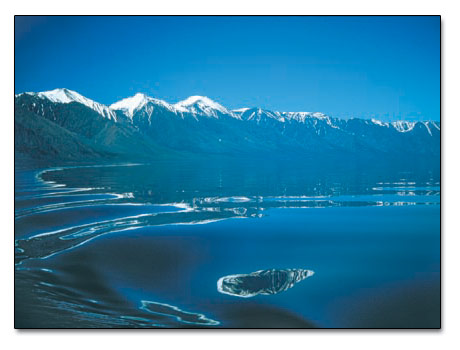
PUTIN PLEASES ENVIRONMENTALISTS BY RE-ROUTING PACIFIC PIPELINE
Publication: Eurasia Daily Monitor Volume: 3 Issue: 82
By:

As Russia prepares to start construction of a major oil pipeline from East Siberia to the Pacific tomorrow, April 28, the Kremlin offered a generous gesture towards environmentalists unhappy with the pipeline’s route. The pipeline is considered to be a major channel for implementing Moscow’s policy of re-orienting its hydrocarbon exports from European buyers to Asian consumers.
Speaking at a meeting of Siberian regional leaders in the West Siberian oil city of Tomsk yesterday, April 26, Russian President Vladimir Putin gave the order to build the $11.5 billion Pacific pipeline 40 kilometers north of Lake Baikal, the largest freshwater lake on earth.
The pipeline “must go along the watershed, north of Lake Baikal’s watershed,” Putin told the Siberian governors and Cabinet ministers gathered in Tomsk. “If there is the smallest danger of polluting Baikal, then, thinking about future generations, we must do everything not simply to minimize this danger but to eliminate it,” Putin said.
At the same meeting, Nikolai Laverov, vice president of the Russian Academy of Sciences, argued that re-routing the pipeline away from the lake’s shoreline would ensure that Baikal would not be polluted. After months of ignoring such arguments, Putin suddenly accepted the premise. “The route will go to the north of the area pointed to by Academician Laverov. Let’s consider it a done deal,” Putin said in televised remarks.
Transneft chief executive Semyon Vainshtok said he was stunned by Putin’s decision but added, “orders are not discussed.” He said that the project would go ahead as scheduled and the construction would start on April 28. Vainshtok also said that the length and cost of a new route for the pipeline could be estimated within two months. “I cannot say at this point how much longer the new route will be, nor how much more it will cost,” he said (RIA-Novosti, April 26). Earlier this week Vainshtok estimated that a detour around Baikal would run around $900 million (Ekho Moskvy, April 20).
Transneft’s previous plans had included a stretch of pipeline running 800 meters from the shore of Baikal. Regional leaders, such as Irkutsk governor Alexander Tishanin, as well as 73 State Duma deputies have urged officials to move the pipeline away from Baikal. Thousands of people in Irkutsk, Moscow, and other Russian cities protested the planned oil pipeline near Baikal (see EDM, April 24).
Not surprisingly, environmental groups hailed Putin’s sudden about-face. Green Party leader Alexei Yablokov said Putin’s statement was “a great victory for public pressure.” “This is the correct decision,” he said. “It will save Baikal” (RIA-Novosti, April 26).
Greenpeace Russia also welcomed the move. “The decision to draw the oil pipeline route outside of the water intake area of Lake Baikal is smart and environmentally correct. I welcome it,” said Sergei Tsyplyonkov, executive director of Greenpeace Russia (Interfax, April 26).
Yevgeny Schwartz, head of conservation programs at the World Wildlife Fund in Russia, said the decision could signify a “turning point” in Russia’s development, and praised Russia for not following the example of countries like Nigeria, where state monopolies are more important than legal and parliamentary opinions (RIA-Novosti, April 26).
Russia’s Kommersant daily commented that the pipeline’s re-routing would take longer to construct, up to 2010. Costs would also go up by some $1 billion and the pipeline is now likely to require government subsidies (Kommersant, April 27). Nezavisimaya gazeta pointed out that, apart from addressing legitimate environmental concerns, Putin had also scored a significant public relations break-through ahead of the July G-8 summit in St. Petersburg (Nezavisimaya gazeta, April 27).
Simultaneously, Putin also said that construction of an oil refinery in Russia’s Far East would help to maximize the pipeline’s profits. Putin cited data from the Ministry of Economic Development and Trade that estimated the cost of the refinery at between $2.19 billion and $2.92 billion, and said the state-owned oil company Rosneft could start construction on such a facility next year (RIA-Novosti, April 26).
Earlier this month, Rosneft deputy head Alexei Kuznetsov said the company had been mulling construction of a huge oil refinery in conjunction with the Pacific pipeline with a capacity of up to 20 million tons per year.
In the meantime, the Kremlin made little secret of the agenda driving the Pacific pipeline. After ordering the routing change, Putin accused the West of unfair practices in global energy dealings. Putin said Russia should look to the East for energy partners, as elsewhere Russian companies face discrimination. “We should look for sellers’ markets” and prioritize the Asia-Pacific region, he said. The pipeline should be made a priority, as Russia looks to supply the Asia-Pacific region, and particularly China, he added (RIA-Novosti, April 26).
Transneft head Vainshtok argued that Russia “overfed Europe with crude.” He complained that now Russia was unable to reduce supplies to Europe. “As soon as we re-orient to China, South Korea, Australia, and Japan, then we could take away crude from Europe,” he said (Nezavisimaya gazeta, April 24). Therefore, the Pacific pipeline is destined to help Russia to sharply re-orient its exports from the West to Asian consumers.




